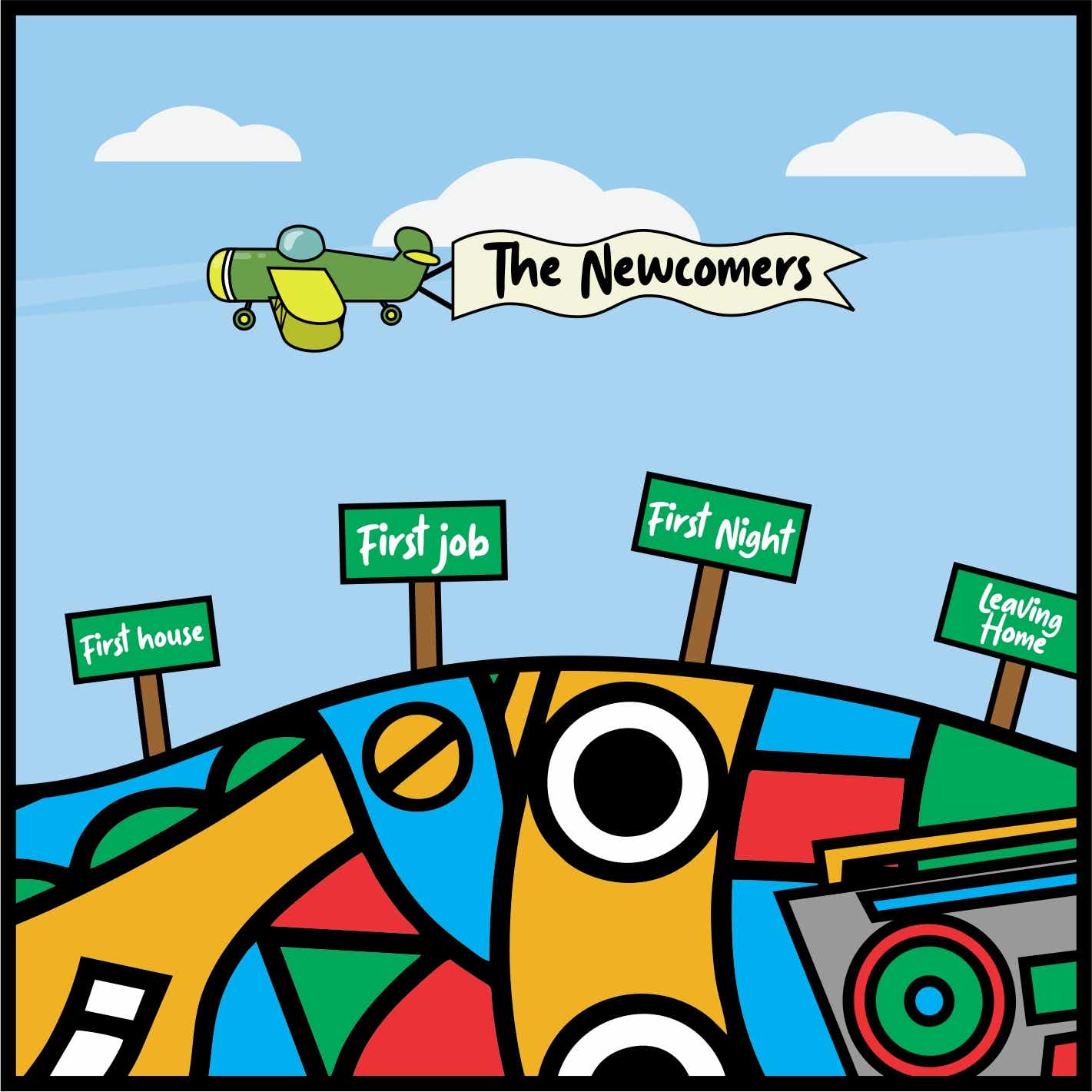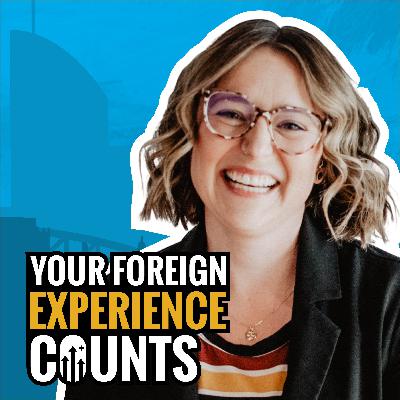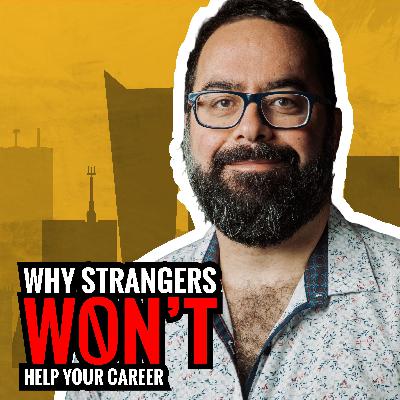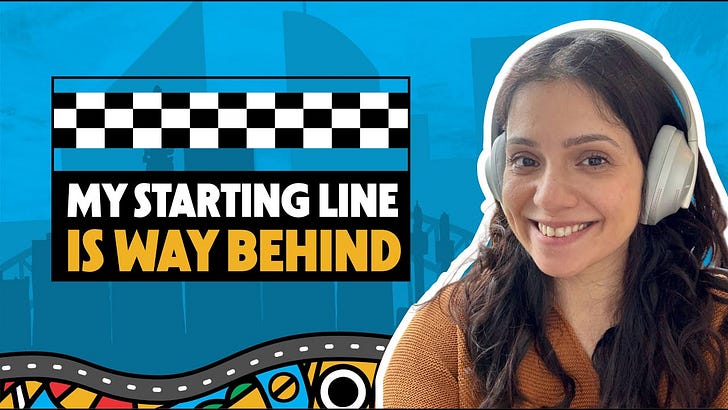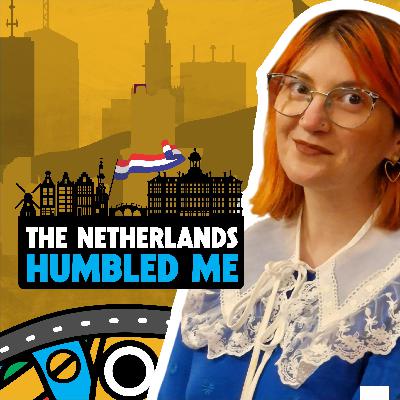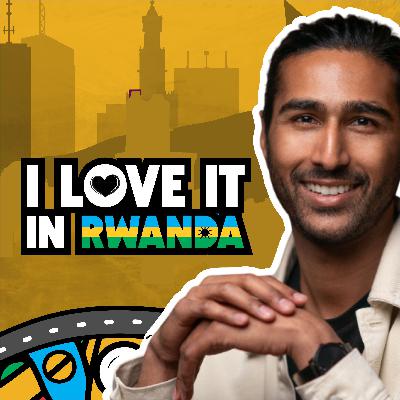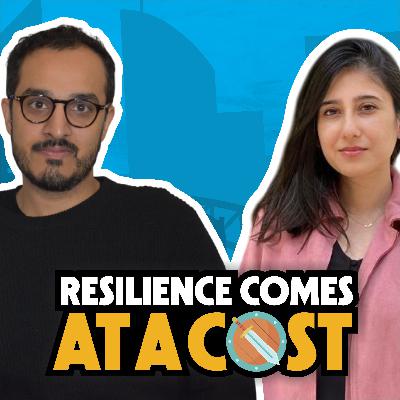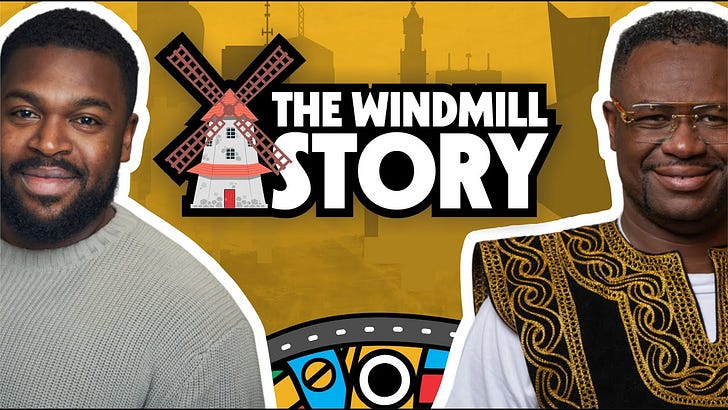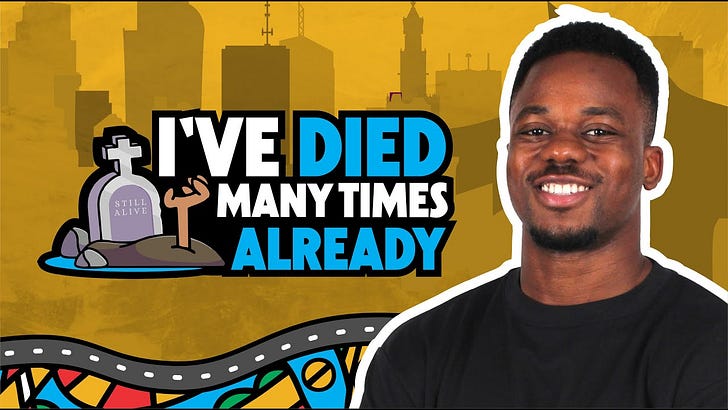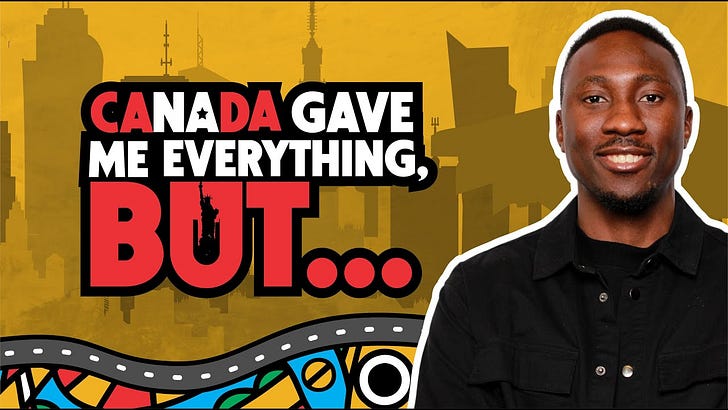Discover The Newcomers Podcast 🎙️
The Newcomers Podcast 🎙️

The Newcomers Podcast 🎙️
Author: Dozie Anyaegbunam
Subscribed: 0Played: 12Subscribe
Share
© Dozie Anyaegbunam
Description
Interviews with immigrants and stakeholders involved in the immigration process where we explore the immigration journey, raising kids in a new culture, cultural adaptation, integration, identity, and everything in-between.
thenewcomerspod.com
thenewcomerspod.com
128 Episodes
Reverse
In this episode, I’m speaking with Jennifer Aikoroje, host of the Inside Your Finance podcast. Jennifer and I explore what happens when you’re too young to grasp the full weight of immigration, when you don’t have the words to explain the churning feelings inside you. But then you grow up. You become an immigrant yourself. And suddenly, your parents’ impossible choices start to make sense.She talks about that moment when her dad left her in Canada and returned to Nigeria for two more years. As a teenager, she felt like he had abandoned her. Now she gets it. Especially after making sure she secured a job before she moved to the United Kingdom.But we don’t only talk about heavy stuff.Jennifer and I also chat about:Taking professional risks when you don’t feel readyWhy showing up beats being perfectImmigrating to the UK as an adult and the lessons she learned
In this episode, I’m speaking with Imole Ashogbon, a fractional HR consultant who helps small and mid-sized businesses, executives, and HR teams when they need senior-level HR leadership, without the cost of a full-time executive.Imole and I explore a nagging question I have about Canada’s much-talked about productivity decline: Are we declining in productivity because we lack talent OR because our broken systems aren’t able to take advantage of all the talent we have seating around in Canada?Imole thinks we’ve created a strange contradiction. We bring in immigrants through Express Entry (a competitive immigration pathway meant to attract young, educated, upwardly mobile individuals.) Then we act like we’re doing them a favor. Like immigration is charity work. It’s not.45% of recent immigrants have university degrees but work in jobs that don’t require post-secondary education. Which is an absurd waste of talent in my opinion.Imole and I chat about:Why businesses need to culturally integrate just as much as immigrantsWhy immigration is investment, not aidHow to build systems that actually deploy immigrant talentThe misalignment between immigration policy, employment strategy, and economic growth targets
In this episode, I’m speaking with Jerry Onyegide, who built a tax business by accident, just from answering questions about Canadian taxes on Twitter for years.Jerry never intended to formalize his knowledge. He’d see misinformation about Canadian taxes, correct it with detailed explanations, and move on with his day. People stopped arguing and started asking more questions. Eventually someone told him, “You need to formalize this. We don’t have anyone in the community who explains taxes this way.”And that’s how he launched Tax Whiz. Still, he was surprised by the number of people who booked consultations.Jerry and I discuss common tax mistakes immigrants make. We also explore:How his service differs from traditional tax consultantsThe confusing Canadian tax systemWhy your tax planning needs to start in January instead of May
In this episode, I’m speaking with Roy Ratnavel, a retired financial services executive and the author of the #1 Canadian national bestselling book Prisoner #1056.Roy’s philosophy for life seems simple but I think it’s a hard one for most of us to adopt: fix yourself before you fix the world. If you’re a good husband, you raise good kids. Good households create good communities. Strong communities build strong societies. Strong societies make stronger countries.And I think Canada needs a lot of this at the moment. Everything is ground up, not top down. The government can’t control what goes on in your head or within the four walls of your home. No regulation can stop that. So it comes down to individuals—not as a selfish notion, but as a recognition that you need to fix your flaws before pointing out others’ shortcomings.Roy spent a decade after arriving in Canada blaming everyone else for his struggles. At 31, he realized he was the problem. He went to war with the man in the mirror, sought therapy for PTSD, and completely changed his approach to life.Roy and I chat about my biggest lessons from reading his book. We also explore:Why the 2010 Winter Olympics was the most Canadian he’d ever feltHow Canada can unite people across differencesWhy we need to lower the barrier but not the barMoral exhibitionism vs. real solutionsLying to yourself versus being honest about mistakes
In this episode, I’m speaking with Nisrine Maktabi, a trauma-informed coach and registered psychotherapist with over a decade of experience supporting newcomers, international students, and multicultural professionals in Canada and globally.Nisrine usually works with newcomers and second-generation immigrants, helping them work through something most immigrants don’t recognize as trauma: people-pleasing.Surprised? I was too. She says people-pleasing isn’t about being nice or accommodating. It’s a survival response called “fawning”—your nervous system’s way of keeping you safe by making others happy. For children of immigrants especially, people-pleasing becomes how they survive in families where belonging feels conditional.Conditional on you operating within the rigid rules about behavior, identity, and cultural adherence.Nisrine and I chat about why your nervous system adapts to keep you safe. We also explore: The coconut effect and why strict parenting backfiresCanada’s systemic barriers for highly educated newcomersWhy discrimination triggers old wounds, and how to process themHow to connect your children to their roots without imprisoning them
In this episode, I’m speaking with Kristina McPherson, who moved from Jamaica to Canada in 2014, and now runs As Told By Canadian Immigrants, where she’s the guide she wishes she had before she moved to Canada.There’s a lot to unpack in this episode, but the part I can’t stop thinking about is when Kristina talks about “post-immigration stress disorder,” a term she coined to describe what many immigrants go through as they try to settle into their new home. I believe it’s also called Ulysses Syndrome.There’s the constant anxiety. There’s the uncertainty that has you feeling unsettled. There’s the mental load of running two parallel tracks—getting through today while worrying if you’ll even be here tomorrow.For Kristina, it was LMIA complications. Provincial nominee programs that wouldn’t work in time. Express Entry launching with 800-point cutoffs. Submitting her PR application two months before her work permit expired, then living on implied status for months.During that time, Christina lived with two pots, two plates, two glasses. Everything she owned fit in a suitcase. Because if immigration forced her to leave, she wanted it to be easy.Kristina and I chat about the emotional toll of living in limbo for years. We also explore: Living two and a half years out of a suitcaseWhy she started “As Told by Canadian Immigrants”Why we need to put boundaries around how one consumes immigration information on social mediaBeing ‘in-betweeners’ caught between cultures
In this episode, I'm speaking with Paul Bakhmut, who moved from Ukraine to Edmonton, Canada 15 years ago as an international student and is now running for mayor. Paul is big on first impressions. And he still remembers his first impression of Edmonton: no bus from the airport to the city. You had to drive or find a cab. Even now, the bus only goes to the train station, not downtown. His vision for Edmonton in two years if he wins? A city that looks and feels alive, not one littered with "for lease" signs. A place that feels safe, not just in police statistics but in actual lived experience. But Paul is practical in how he expects to achieve all these goals. He accepts that Edmonton needs to get more competitive with business taxes and become an open, smart, and fun city that attracts businesses and sets a cultural tone that values what newcomers bring.In this conversation, Paul and I chat about how his view of Canada has changed over the past 15 years. We also explore:Why Alberta’s immigration boom creates challenges and opportunitiesWhy the city’s own hiring practices matter for the broader marketWhy he still believes in the promise of Canada after 15 yearsThe importance of judging newcomers on merit, not credentialsThe city’s role in setting the cultural tone on hiring newcomers
Please forward this to ONE friend today and tell them to subscribe here.In this episode, I’m speaking with Keely Cronin, Co-Founder of WorkSpark, where they support professionals who have migrated to Canada as well as anyone looking to make a mid-career transition. One conversation she has over and over again with the folks she coaches is the gap, or more like valley between your qualifications, experience, skillset, and the infamous first survival job most newcomers have to start with in Canada. Keely’s point of view is even if you’re a deep-sea engineer working at Tim Hortons, you should see that time as valuable Canadian experience. And as roles that immerse you in everyday Canadian culture. Which means you should put them on your resume and frame them as work experience that shows you have soft skills to fit into your potential new job like a glove.In this conversation, Keely and I chat about the soft skills you develop in such jobs. We also explore:* Why she thinks Canada’s immigration narrative doesn’t match reality* Culture and self-promotion* Why moving countries makes you a baby again (but with baggage)* Why it’s a good idea to experience Canada before job hunting ( but them bills don’t wait though)Dozie’s NotesA few things that stuck with me as I listened through this week’s conversation:* During the immigration process, the focus is usually on what the immigrant brings to Canada. However, once we land, the narrative seems to shift to all Canada is giving you. This weird shift seems to be creating an environment where the public doesn’t recognize the talent or contributions of immigrants to the economy and the country.* Structural barriers need policy solutions, not resilient individuals. We should celebrate resilience. But…individual resilience and networking can only go so far. Issues like inconsistent credential recognition across provinces and unclear processes need government fixes. * Moving to a new country literally resets you to ground zero. You are like a baby experiencing the world again. Except this time around you carry the burden of your previous life’s experiences and expectations. Accept this reality. That’s the first step towards turning this mental burden into a strength.Official Links✅ Connect with Keely Cronin on LinkedIn✅ Schedule a free career assessmentOne AskIf you found this story helpful, please forward or share it to one immigrant out there.Or join us as we explore the bitter-sweet world of the immigrant. This is a public episode. If you would like to discuss this with other subscribers or get access to bonus episodes, visit thenewcomerspod.com
Please forward this to ONE friend today and tell them to subscribe here.In this episode, I'm speaking with Mher Mardoyan, a career coach who's been helping newcomers to Canada find jobs with a 90%+ success rate.With the rise and rise of AI in job applications, it's beginning to seem like traditional online job applications are a losing game for newcomers to Canada. Because for every job posting, there are thousands of applicants and only a tiny weeny number get called in for interviews. Mher thinks its about 2%.The way out, Mher believes, is the hidden job market. This is where majority of the hiring happens. And the only way to access these opportunities is through networking and referrals.Because people help people they know and trust, not strangers asking for favors.In this conversation, Mher and I chat about his seven-step coaching process. We also explore:* Why applying for jobs should be your last resort, not your first* The importance of celebrating small wins during your job search* His one tip for standing out in today's competitive job market* Why investing in your career pays off faster than waiting for free helpDozie’s NotesA few things that stuck with me as I listened through this week’s conversation:* Networking is like banking; you first deposit then you withdraw. That someone accepted your connection request on LinkedIn doesn’t mean you should ask them if they can help you find a job immediately. I personally think it’s cringe. Spend some time investing in the relationship. And in due time, you’ll build up enough social credit that allows you ask for help with your job hunt or a referral.* Tell your story. Mher thinks if your story demonstrates how you save employers time, money or increase profit, you’ll be in demand. Methinks same too.* Job hunting in today’s market is emotionally exhausting. Take breaks. Celebrate small wins. Ask for help.Official Links✅ Connect with Mher Mardoyan on LinkedIn✅ Book a career consultationOne AskIf you found this story helpful, please forward or share it to one immigrant out there.Or join us as we explore the bitter-sweet world of the immigrant. This is a public episode. If you would like to discuss this with other subscribers or get access to bonus episodes, visit thenewcomerspod.com
Please forward this to ONE friend today and tell them to subscribe here.In this episode, I am speaking with Ben Joffe, a French native who's lived and worked across Japan, Korea, China, Singapore, Malaysia, Hong Kong, United States, Germany, and currently Portugal. Ben also speaks fluent French, English, Japanese, pretty bad Korean and Chinese, and average Portuguese (thanks to high school Spanish classes).Talk about being a global citizen. This lived experience means Ben has developed a great understanding of how much our default cultural programming defines how we see and interact with the world. Having your default cultural programming turned on is not necessarily a bad thing. However, it’s important we recognize that we all have these underlying prompts which influence our language structure, our views on material success, personal relationships, and more. Especially when we move to a new country.In this conversation, Ben and I explore why some cultures lead with “what do you do?” while others consider that question rude. We also chat about:* Local comedy and why it’s a great way to understand cultural nuances and codes* Why he’s more focused on teaching his kid curiosity than nationality* The phone call that changed his understanding of Korean culture* Why he doesn't identify as an immigrant or expat despite living in 7+ countriesDozie’s NotesA few things that stuck with me as I listened through this week’s conversation:* The same word can mean different things depending on where you are from. A major barrier to cross-cultural understanding isn’t a lack of shared language but the hidden cultural codes behind words. A term like “friendship” or “car” has a completely different meaning in Korea, the U.S, or France. Learn to ask “What do you mean?” whenever possible.* Cultural fluency which then leads to proper integration is an everyday activity. To truly understand a new country or society requires deliberate effort. Learn the language, watch local stand-up comedy, volunteer, engage in local activities. Being a passive observer rarely helps.* Your multicultural identity is additive. A multicultural identity is not about losing a piece of one culture to gain another. Instead, it’s you adding new layers to your identity that end up creating a human that’s more than the sum of their parts.Official Links✅ Connect with Ben Joffe on LinkedIn✅ Check out Ben’s vibe coding course✅ Consider reading The Culture Code by Clotaire RapailleOne AskIf you found this story helpful, please forward or share it to one immigrant out there.Join us as we explore the bitter-sweet world of the immigrant. This is a public episode. If you would like to discuss this with other subscribers or get access to bonus episodes, visit thenewcomerspod.com
Please forward this to ONE friend today and tell them to subscribe here.In this episode, I'm speaking with Gabriela Casineanu, author of Job Fairs: How to Get the Most of Your Participation, and founder of Introverts Academy.A big part of why I wanted to chat with Gabriela is because I believe that when you move, you temporarily become an introvert. She did disagree with my theory. She thinks immigrants or newcomers become quiet or withdrawn because when you face a lot of rejection while job hunting, you become shy or afraid to speak up.There's more. And she breaks it down in great detail. But you have to listen to the episode.In this conversation, Gabriela and I chat about detaching your identity from your profession. We also explore:* Why immigration is an opportunity to ask yourself what you really want to do* Her one-word advice for immigrants struggling to integrate* How to focus on what you can control in the job search process* The importance of bringing your “human side” to the job search, not just your diploma or degreeDozie’s NotesA few things that stuck with me as I listened through this week’s conversation:* A lot of us move physically but don’t move mentally. In that case, you really haven’t immigrated. Integration starts when you become curious and adopt a beginners mind. That’s how you start learning the rules of your new home.* Proactive connection beats passive application. Sending resumes are great but they can only get you so far. Reach out, book informational interviews, volunteer at conferences. These tactics help you build visibility, trust, and launches you into the hidden job market where there's less competition.* "Reframing" is the ultimate immigrant hack. Learn to reframe your challenges. By changing a negative statement (I hate networking) into a curious question (Who can I ask for information?), you alter your energy state, your actions, and the outcomes.Official Links✅ Connect with Gabriela Casineanu on LinkedIn✅ Learn more about Introverts Academy✅ Get the Job Fairs: How to Get the Most of Your Participation book for FREE to learn more about reframingOne AskIf you found this story helpful, please forward or share it to one immigrant out there.Join us as we explore the bitter-sweet world of the immigrant. This is a public episode. If you would like to discuss this with other subscribers or get access to bonus episodes, visit thenewcomerspod.com
Please forward this to ONE friend today and tell them to subscribe here.In this episode, I'm speaking to Sweta Regmi, who's lived in Canada for over two decades.Two decades is a while, and Sweta says if she were to compress all she's learned over those years into one piece of advice for new immigrants, it would be "ASK FOR HELP."I agree. I learned this the hard way. And maybe someday I'll tell that story. But yes, ask for help. Don't try to figure it out all on your own. But there are caveats here. As Sweta puts it, "Watch out for folks who who project their own limitations onto you, like someone who tells you that making six figures is impossible."I think the key message Sweta is passing on here is find people who have lived the life you want to live. This isn't about finding someone with a PhD or a fancy title, but someone with relatable, lived experience who can offer genuine guidance.In this conversation, Sweta and I chat about the importance of finding mentors who are honest about their struggles. We also explore:* Why she sees her 25-year journey in Canada as beautiful* The origin story behind her business, TeachnDo* Why she resisted celebrating Canadian holidays at first, and what changed her mind* Why you shouldn’t compromise your identity just because you want to fit inDozie’s NotesA few things that stuck with me as I listened through this week’s conversation:* Not judging anyone, but those little compromises you make to fit in can often backfire. Integrate all right, but don’t erode your sense of self in the process. You have a heritage that’s beautiful in its own right. * Continuing from above, moving means you can curate the culture you want to uphold or live by. You can choose to discard the negative aspects of your heritage or home culture (like gender biases in Sweta’s case) and replace them with the positive elements from your new culture. The result is a new personalized way of life. Sounds utopian, but it’s doable.* The source of your advice can make or break you. I would go further to say the folks you speak to within the first two weeks in the country can limit or propel you forward. Official Links✅ Connect with Sweta Regmi on LinkedIn✅ Check out the free career resources on the TeachnDo websiteOne AskIf you found this story helpful, please forward or share it to one immigrant out there.Join us as we explore the bitter-sweet world of the immigrant. This is a public episode. If you would like to discuss this with other subscribers or get access to bonus episodes, visit thenewcomerspod.com
Please forward this to ONE friend today and tell them to subscribe here.In this episode, I'm speaking with Shriya Ghate, who moved from India to the UK, back to India, and finally to Canada.Shriya and I explore a theme that's often ignored; the starting line is different for immigrants. And for immigrant women, it's often miles behind everyone else.She talks about being seated at a networking event for women, and as she listens to the challenges faced by women who grew up in Canada, she realizes that before she can even think about networking or getting better at small talk, she has to first figure out the basics:* Where to buy food* How to pay for the bus * How to feel safe in a new placeBut it's not all gloomy. Shriya believes starting over is also a chance to build a new life with some intention. An opportunity to decide who you want to be as a professional and as a person, away from the cultural expectations of your home country.Shriya and I explore the lessons she’s gathered from immigrating twice. We also chat about:* The difference between moving as a student vs. a permanent resident.* The psychological burden of the immigrant job search.* Why Canada felt more like home than the UK.* How to find your place in the world after leaving home* Why small talk can be a hurdle for many immigrantsDozie’s NotesA few things that stuck with me as I listened through this week’s conversation:* Progress compounds but it comes from showing up, fully prepared or not. The feeling of not being ready, of not knowing what to say, or do, or wear can be paralyzing. But they say courage is action in the face of fear. And it’s one thing you have to embody as an immigrant. Show up and learn by doing.* Cultural norms around social interactions are real. So give yourself some grace. Is small talk hard? That’s okay. Don’t beat yourself up about it. But keep an open mind to learning the new social norms or create ways to navigate them.Official Links✅ Connect with Shriya Ghate on LinkedInOne AskIf you found this story helpful, please forward or share it to one immigrant out there.Join us as we explore the bitter-sweet world of the immigrant. This is a public episode. If you would like to discuss this with other subscribers or get access to bonus episodes, visit thenewcomerspod.com
Please forward this to ONE friend today and tell them to subscribe here.In this episode, I'm speaking with Stefana Sopco, who moved from Romania to the Netherlands seven years ago. Stefana had never thought of leaving Romania. But after her husband moved to the Netherlands for better job opportunities, she reluctantly followed; with €80 in her pocket and a lot of anxiety. Now, this isn't a zero to hero story. What I loved about Stefana is how she absolutely refuses to romanticize the immigrant experience. She reminds me of Anam Zakaria of Qissa. She talks about the depression, the anxiety, and the identity crisis that comes with trying to find belonging and acceptance in a foreign culture. Like Stefana, maybe we all need to stop trying to fit into boxes that weren't made for us. Because life is usually much better once we accept ourselves—strange accent and all.In this conversation, Stefana and I chat about the impact immigration can have on one’s mental health. We also explore:* Why immigrants find it easier to make friends with other immigrants* Accepting herself and its benefits* The permanence of being an in-betweener* The guilt and heartbreak that comes with watching your parents age from afarDozie’s NotesA few things that stuck with me as I listened through this week’s conversation:* Every immigrant’s biggest fear is getting the dreaded call that something has happened to their parents. And then depending on when you last travelled back home to see them, you’ll lash yourself with guilt for months or years. * It can be exhausting trying to perform as someone else because you are desperate to fit in. I don’t think there’s anything like being perfectly integrated, except you are a 4yo kid. * You are never going to fully belong to your new country or the old one. I am not sure, but maybe accepting that is the best thing we can do for ourselves. That liminal space is not a problem to solve. It’s an identity that we’ll carry forever.Official Links✅ Connect with Stefana Sopco on LinkedInOne AskIf you found this story helpful, please forward or share it to one immigrant out there.Join us as we explore the bitter-sweet world of the immigrant. This is a public episode. If you would like to discuss this with other subscribers or get access to bonus episodes, visit thenewcomerspod.com
Please forward this to ONE friend today and tell them to subscribe here.In this episode, I'm speaking with Neel Parekh, the Founder and CEO of MaidThis® & MaidThis® Franchise, which helps homeowners and short-term rental hosts (Airbnb, VRBO, etc.) with their cleaner needs. I'm usually curious about two kinds of immigrants; second-gen immigrants because I am trying to understand some of the challenges my kids might face, and immigrants who migrate from the Global West to the Global South. Neel ticks both boxes. His parents moved from India to the United States in the early 80s. And then after seven years of backpacking and running his cleaning business remotely, Neel decided to settle down in Rwanda for a bit. Neel and I chat about the differences between the Western “go go go” culture and Rwanda’s pace where nothing feels as urgent. We also explore:* Falling in love with Rwanda* Building community as an immigrant* Growing up in an immigrant household and now understanding his parents better* Why he’s thinking of splitting his time between East Africa and Los AngelesDozie’s NotesA few things that stuck with me as I listened through this week’s conversation:* I wish I spent more time trying to learn or at least have an idea of Canada’s communication style before I moved. Neel talks about moving from America’s low-context culture (direct, literal communication) to Rwanda's high-context culture (implied meanings, indirect answers) and the friction it came with. I suspect that a lot of the frustrations we encounter early-on in a new country are usually miscommunication issues.* Maybe it’s time to accept that most people are never going to understand the immigrant experience until they’ve lived through it. I’m saying this because part of why I launched this publication was to also help non-immigrants sorta understand their immigrant neighbours better. But I guess experience is the best teacher in most situations, immigration included.Official Links✅ Connect with Neel Parekh on Twitter✅ Chat with Neel about franchising One AskIf you found this story helpful, please forward or share it to one immigrant out there.Join us as we explore the bitter-sweet world of the immigrant. This is a public episode. If you would like to discuss this with other subscribers or get access to bonus episodes, visit thenewcomerspod.com
Please forward this to ONE friend today and tell them to subscribe here.In this episode, I'm speaking with Miracle Inameti-Archibong, who moved from Nigeria to the United Kingdom 18 years ago.We don't often talk about the costs of immigration. And by costs here, I don't mean the financial costs (I think we all have a fair idea of that most times and we somehow hope the move means that won't matter in the long run).I'm talking about realizing that your kids will never had what you had growing up; the beautiful chaos of Christmas mornings with cousins everywhere, the ability to drop by without notice at your sister's home; the ability to just exist within family without having to organize, plan, or explain yourself.This conversation with Miracle left me with more questions than answers.In this conversation, Miracle and I chat about the cultural code-switching that never stops. We also explore:* How she found her voice in the corporate world* Parenting in-between cultures* The subtle ways cultural misunderstandings knock your confidence* The difference between existing and thrivingDozie’s Notes A few things that stuck with me as I listened through this week’s conversation:* Overt racism is bad, but it’s not the thing that usually wears immigrants down. It’s the small misunderstandings, the cultural references you miss, the microaggressions, the fact that you have to explain your background over and over again, and the subtle signals that you don't quite belong here.* The biggest cost of immigration, especially for those of us who grew up in collective cultures, is how moving across countries breaks down family connections across generations. * The biggest paradox of being an immigrant is you can succeed by conventional metrics (career, financial stability, opportunities for your kids) while simultaneously losing something irreplaceable (extended family connections, cultural belonging, community rituals).Official Links✅ Connect with Miracle Inameti-Archibong on LinkedIn✅ Book Miracle to come speak about all things SEO and digital marketingOne AskIf you found this story helpful, please forward or share it to one immigrant out there.Join us as we explore the bitter-sweet world of the immigrant. This is a public episode. If you would like to discuss this with other subscribers or get access to bonus episodes, visit thenewcomerspod.com
Please forward this to ONE friend today and tell them to subscribe here.In this episode, I'm speaking with Anam Zakaria and Haroon Khalid of Qissa, one of the most interesting immigrant storytelling platforms I have come across in recent months.Qissa's flagship project, "Driving Canada," started as casual conversations with Uber drivers as Anam and Haroon navigated doctors appointments, daycare, and all the stuff new parents have to deal with. Almost all the drivers were immigrants. Almost all were overqualified. Almost all had stories about the systemic barriers that shoved them into the gig economy.The shitty thing about all this is you sometimes see people term this struggle as a "rite of passage." We call it resilience. And instead of pushing for policy changes that fix the system, we celebrate the immigrants ability to survive it. With no care for its toll on the individuals, their loved ones, their community, and Canada.In this conversation, Anam, Haroon, and I explore the cost of resilience. We also chat about:* Why most immigrant settlement programs serve yesterday’s immigrants, not today’s* Why we need to fix the system instead of glorifying the struggle* Launching Qissa* The power of storiesOfficial Links✅ Connect with Anam Zakaria on LinkedIn✅ Connect with Haroon Khalid on LinkedIn✅ Read the Driving Canada ReportOne AskIf you found this story helpful, please forward or share it to one immigrant out there.Join us as we explore the bittersweet world of the immigrant. This is a public episode. If you would like to discuss this with other subscribers or get access to bonus episodes, visit thenewcomerspod.com
Please forward this to ONE friend today and tell them to subscribe here.In this episode, I'm speaking with Robert Ndoping and Oumar Dicko of Windmill Microlending, Canada. When Robert and Oumar tell you that Windmill has funded over 14,000 skilled immigrants to get re-credentialed in their professions, with an average loan size of $10,183, totaling nearly $146 million in approved loans, and a repayment rate of 95%…You'll probably go, ‘Wow, that's impressive.’When you hear the story of the ENT surgeon driving Uber in Toronto while kids wait months for surgery, you realize that it isn't just impressive, it's necessary. There are a lot of things Canada does right about immigrant settlement. But there are also a lot of areas in which we could do better. The skilled immigrant credential recognition is one of those areas. And Windmill Microlending is proof that Canada wins when we make sure skilled immigrants can contribute to the economy as fast as possible. Because for every 10,000 clients Windmill empowers, an additional $3.6 billion in lifetime tax revenue is generated for Canada.In this conversation, Oumar, Robert, and I chat about Windmill Microlending’s loan model. We also explore:* Walking the talk when it comes to skilled immigrant settlement* Why the work is personal for both of them* The human impact of their work* Why we need to move the immigrant conversation from “immigrant struggling” to “untapped potential”* Why immigrants don’t need savingOfficial Links✅ Connect with Robert Ndoping on LinkedIn✅ Connect with Oumar Dicko on LinkedIn✅ Read Windmill’s Impact Report ⤵One AskIf you found this story helpful, please forward or share it to one immigrant out there.Join us as we explore the bitter-sweet world of the immigrant. This is a public episode. If you would like to discuss this with other subscribers or get access to bonus episodes, visit thenewcomerspod.com
Please forward this to ONE friend today and tell them to subscribe here.In this episode, I'm speaking with O'Nell Agossa, who moved to Canada from Benin as a nine year old. At 13, a lady on a bus told O'Nell to “go back to where you're coming from.” But he's refused to give that experience the power to define who he was or who he has grown up to be. Instead, he thinks that the confusion others feel is not your problem to solve. You don't owe anyone an explanation of who you are. You don't need to fit into their narrow categorizations that make them feel comfortable. You just need to be.In this conversation, O’Nell and I explore curiosity as a way of life and why he’s writing a book about the trait. We also chat about:* Why the immigrant experience is about hope and renewal* Immigrants as bridges between worlds* The weight immigrant parents carry* Why you don't need to ask permission to belongOfficial Links✅ Connect with O’Nell Agossa on LinkedIn✅ Follow along as he prepares to publish his book, Curiosity and IOne AskIf you found this story helpful, please forward or share it to one immigrant out there.Join us as we explore the bitter-sweet world of the immigrant. This is a public episode. If you would like to discuss this with other subscribers or get access to bonus episodes, visit thenewcomerspod.com
Please forward this to ONE friend today and tell them to subscribe here.In this episode, I'm speaking with Kelly Boyi, who left Canada for the United States after 12 years of building a life here.First off, this isn't a "Canada bad, America good" story. Kelly spent over a decade in Canada. His entire family lives here. He credits Canada for giving him his first job, first relationship, and first house.But when you're an ambitious individual watching the best minds from UofT and Waterloo migrate south, when you hear that you could get better pay while working with folks building potential rocket ships, you would be forgiven for getting a tad introspective.I also like that Kelly didn't mince words about our flaws as a country. Look, Canada is a fantastic country. But we aren't moving forward if we don't get good at having uncomfortable conversations about the kind of country we want to build for those coming after us.In this conversation, Kelly and I explore why loving Canada isn’t enough to stay anymore. We also chat about:* The grant system’s interesting “apply early” secret* Why Canadian monopolies and bureaucracy are stifling innovation and ambition* The famous Silicon Valley “energy”* Why you can’t afford to be complacent as an immigrantOfficial Links✅ Connect with Kelly Boyi on LinkedIn✅ Speak to Kelly for career coaching and other related servicesOne AskIf you found this story helpful, please forward or share it to one immigrant out there.Join us as we explore the bitter-sweet world of the immigrant. This is a public episode. If you would like to discuss this with other subscribers or get access to bonus episodes, visit thenewcomerspod.com


